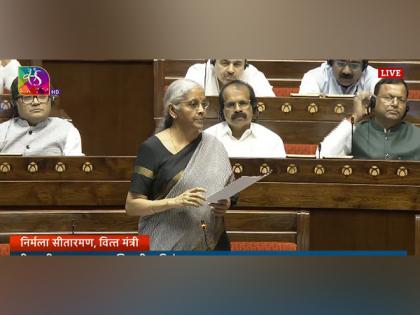IBC Amendment Bill 2025, has provisions for faster and efficient resolution of insolvency cases
By ANI | Updated: August 13, 2025 12:29 IST2025-08-13T12:23:48+5:302025-08-13T12:29:56+5:30
New Delhi [India], August 13 : Finance Minister Nirmala Sitharaman on Tuesday introduced the Insolvency and Bankruptcy Code (Amendment) ...

IBC Amendment Bill 2025, has provisions for faster and efficient resolution of insolvency cases
New Delhi [India], August 13 : Finance Minister Nirmala Sitharaman on Tuesday introduced the Insolvency and Bankruptcy Code (Amendment) Bill, 2025 in the Lok Sabha, aiming to reduce delays and strengthen governance of the insolvency resolution process.
The Bill, which proposes several structural and procedural changes to the Insolvency and Bankruptcy Code (IBC), 2016, was referred to a Select Committee for wider examination.
The proposed amendments in the bill seeks to incorporate new concepts including a Creditor-Initiated Insolvency Resolution Process (CIIRP), enabling provisions and measures to enhance efficiency at both resolution and liquidation stages.
Under the existing law, applications for initiating corporate insolvency resolution must be admitted within 14 days, but in practice the process takes over 434 days on average. To curb this delay, Section 7 of the insolvency and bankruptcy code (IBC Code) is proposed to be amended to mandate admission solely on the existence of defaults.
Records from information utilities is proposed to serve as sufficient evidence when the applicant is a financial institution. This is expected to significantly cut admission timelines and reduce value erosion.
To Streamline the corporate insolvency resolution process (CIRP) many reforms were proposed in the bill. It includes expanding the definition of resolution plans to allow asset sales, restricting the corporate applicant's role in proposing resolution professionals, clarifying government dues priority, and placing tighter controls on the withdrawal of CIRP applications.
The amendments also proposed a monitoring committee for plan implementations and give creditors a right to initiate such proceedings.
The amendments in the bill also empowers the Committee of Creditors (CoC) to supervise liquidation and if needed replace liquidators with a two-thirds vote.
To fast-track process, the amendments allows new CIIRP to select financial institutions and initiate insolvency outside court under the supervision of a resolution professional. The debtor can also retain management control under professional supervision.
Objections can be raised within 30 days, and the adjudicating authority will be empowered to convert it into a standard CIRP if resolution is not achieved within 150 days.
For group insolvency cases, a new Chapter V-A is introduced in the new bill, to enable coordinated or consolidated insolvency proceedings for group companies.
It allows shared benches, coordinated CoCs, common professionals, and enforceable inter-company agreements to reduce duplication and maximise value.
The Bill introduces new Section 240C, for cross-border insolvency cases, which empowers the government to frame rules for cross-border insolvency and designate dedicated benches, moving beyond the current bilateral arrangement system.
Other Reforms in the bill includes provisions like removing the interim moratorium for personal guarantors, measures to prevent fraudulent transactions, an electronic portal for IBC processes, greater regulatory powers for IBBI, and decriminalisation of certain offences.
Disclaimer: This post has been auto-published from an agency feed without any modifications to the text and has not been reviewed by an editor
Open in app